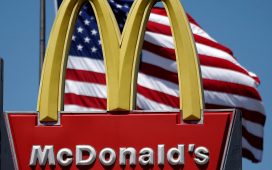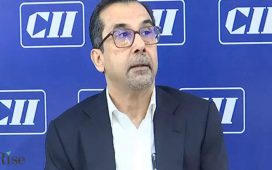The Co-operative Group has warned its profits are likely to fall in the year ahead as the food to funerals group expects “turbulent economic headwinds, including inflationary pressures” to continue.
While that “volatile external environment” contributed to an 11% fall in profits at the 160-year-old mutual’s grocery arm, which has more than 2,000 stores, the group said underlying operating profits across the business had remained steady at £100m.
However, pre-tax profits soared to £247m in the year to 31 December from £57m a year before, thanks to a one-off profit from the sale of its petrol forecourts business to Asda in October and a strong performance by its funerals and legal business.
Sales for the group rose 3% to £11.5bn, including a 1.3% increase at its grocery business, where the volume of goods sold slid back as shoppers put fewer items in their baskets because of high price rises on food and other bills and some availability problems for the group as a result of IT glitches in the first part of the year.
Profits at the grocery business were affected by a £55m increase in pay and a £37m investment in trying to keep prices down for shoppers.
Sales and profits at the group’s funeral and legal businesses rose strongly as the group took market share from rivals amid a death rate that remained higher than historical averages for most of the year.
Shirine Khoury-Haq, the chief executive of the Co-op, credited the group with “a robust performance in what has been a difficult and disruptive trading year for many businesses”.
Khoury-Haq, who took on the top job in August 2022 after stepping up from her role as finance director, took home £1.5m in pay last year, including £766,000 in bonuses relating to this year and 2020. The details, revealed in the company’s annual report published on Wednesday, show she could earn up to £2.6m this year if she hits all her targets.
The outgoing chief executive, Steve Murrells, meanwhile, took home almost £1.4m pay, despite leaving in May. He received £375,000 in lieu of notice on top of his basic salary and a share of the 2020 bonus.
Khoury-Haq said profits had been underpinned by £101m in cost savings, including some job cuts at head office last year, while the group cut its debts to £330m from £920m after the sale of the forecourts business.
She said profits in the year ahead were likely to fall as the group was facing energy costs that were as much as double those in previous years, while labour costs had also increased sharply.
“We, along with many others, fully expect the challenging external conditions to continue throughout 2023. High levels of inflation are predicted to continue until at least mid-year, before beginning to fall, and a recession, both here in the UK and globally, remains a significant possibility,” she said.
“We are committed to doing all we can to shield members, colleagues and customers from this, and other rising costs, as much as we possibly can.”
Khoury-Haq said the group was focused on growth for the year ahead but was aiming to achieve this through low-cost means such as more franchise outlets and wholesale business after buying the Nisa group of convenience stores, and doing more online.
after newsletter promotion
Online grocery sales rose by 24% last year as the retailer teamed up with specialists, including Deliveroo, to take 15% of the fast-track grocery delivery market. The Co-op said it was now seeking to double its market share.
The Co-op also wants to attract 1 million more members, after adding 140,000 in the past year. It was the first increase in five years, and took the total number to 4.27 million members. Khoury-Haq said special offers for members had helped attract younger shoppers.
Asked whether the Co-op would consider following John Lewis in looking at opening up to outside investment, she said the group had no plans to do so after cutting its debt last year. “We have taken action last year so we are well positioned to grow the business,” she said.
Allan Leighton, the chair of the Co-op who is to step down in February next year when his nine-year term ends, said: “We are of course not immune to the stark realities facing all consumer-led businesses, with soaring energy and other inflation-related costs continuing to weigh heavily on short-term expenses and operating profits.
“The actions we have taken already have provided us with the ability to weather this over the short-term and to capitalise more fully over the longer term.”
The Co-op said it had already begun searching for a successor to Leighton and several other board members who are due to step down in the next year.







